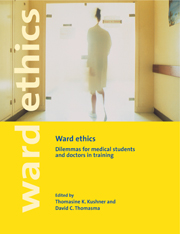Book contents
- Frontmatter
- Contents
- Acknowledgments
- List of contributors
- Prologue. Breaking the silence
- Letter from a young doctor
- Part I On caring for patients
- Section 2 Problems in truth-telling
- Section 3 Setting boundaries
- Part II On becoming a “team player”: searching for esprit de corps and conflicts of socialization
- Section 5 Argot, jargon, and questionable humor: assuming the mantle at the patient's expense
- Section 6 Making waves: questioning authority and the status quo
- Section 7 Perceiving misconduct and whistle-blowing: observing peers or superiors commit an act deemed unethical
- Epilogue: Using this book
- Glossary
- Index
Part I - On caring for patients
Published online by Cambridge University Press: 05 February 2015
- Frontmatter
- Contents
- Acknowledgments
- List of contributors
- Prologue. Breaking the silence
- Letter from a young doctor
- Part I On caring for patients
- Section 2 Problems in truth-telling
- Section 3 Setting boundaries
- Part II On becoming a “team player”: searching for esprit de corps and conflicts of socialization
- Section 5 Argot, jargon, and questionable humor: assuming the mantle at the patient's expense
- Section 6 Making waves: questioning authority and the status quo
- Section 7 Perceiving misconduct and whistle-blowing: observing peers or superiors commit an act deemed unethical
- Epilogue: Using this book
- Glossary
- Index
Summary
One of the essential qualities of the clinician is interest in humanity, for the secret of the care of the patient is in caring for the patient.
Francis Peabody (1)I wouldn't demand a lot of my doctor's time; I just wish he would brood on my situation for perhaps five minutes, that he would give me his whole mind just once. I would like to think of him as going through my character, as he goes through my flesh, to get at my illness, for each man is ill in his own way … Just as he orders blood tests and bone scans of my body, I'd like my doctors to scan me, to grope for my spirit as well as my prostate.
Anatole Broyard (2)When does a doctor become a doctor? We queried doctors from a wide range of specialties, age groups, and geographical locations and asked them to describe what marks the transition: What event or events must transpire in order to turn a “civilian” into a professional? Initially, they recited moments that signified “offcial” recognition, such as: “When I received the white coat” or “At my graduation” or “When I received my license.” However, the real significance of such external signposts is captured in one doctor's story of the day he realized “the power of the white coat:”
I started the “Physical Diagnosis” class at my medical school just as I had completed most of my basic sciences courses. The class was taught by the chief of medicine, one of the best clinicians I've ever known. The first day set the format for the course.
- Type
- Chapter
- Information
- Ward EthicsDilemmas for Medical Students and Doctors in Training, pp. 9 - 16Publisher: Cambridge University PressPrint publication year: 2001



